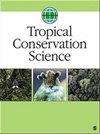印度卡纳塔克邦对豹子的威胁
IF 1.6
4区 环境科学与生态学
Q2 BIODIVERSITY CONSERVATION
引用次数: 11
摘要
尽管大型猫科动物是野生动物保护的旗舰物种,但由于各种人为影响,它们受到了威胁。绘制大型猫科动物的空间模式和量化威胁可以帮助保护规划和资源分配。豹豹被国际自然保护联盟列为易危物种,因为它面临各种威胁。然而,关于豹子面临的威胁的量化数据却很少。在印度和其他地方,使用铁丝网捕捉野生动物是最严重的威胁之一。诱捕是最简单、最有效的狩猎技术之一,它会影响豹等其他非目标物种。在这项研究中,我们记录了印度豹子诱捕的空间和时间趋势。通过对2009年1月至2020年12月期间报纸和新闻门户网站的内容分析,我们记录了113起豹子被诱捕的事件,其中59.3%(5.5只豹子/年)导致豹子死亡。大多数陷阱(97.5%)是用来捕捉野生猎物的。在有确切位置细节的84起事件中,豹子被诱捕的比例(54.7% = 46),并导致人类密集地区的死亡率(50%)显著更高,这表明这些景观中陷阱的威胁增加。广义加性模型的结果表明,诱捕发生率随人口密度的增加而增加。受保护区域占一个地区内地理区域的百分比对诱捕事件的数量几乎没有影响。研究结果可能有助于豹子的威胁监测和保护计划,尤其是在受保护区域系统之外。本文章由计算机程序翻译,如有差异,请以英文原文为准。
Quantifying Wire Snares as a Threat to Leopards in Karnataka, India
Though large felids are flagship species for wildlife conservation they are threatened due to various anthropogenic impacts. Mapping spatial patterns and quantification of threats to large felines can help conservation planning and resource allocation. The Leopard Panthera pardus, is categorized as Vulnerable by the IUCN as it faces a variety of threats. However, quantified data on the threats faced by leopards is scant. Hunting of wildlife using wire snares is one of the severest threats in India and elsewhere. Snaring, one of the simplest and most effective hunting techniques impacts other non-target species like the leopard. In this study, we document the spatial and temporal trends of snaring of leopards from India. Through content analysis of newspapers and news portals for the period January 2009-December 2020, we documented 113 incidents of leopards caught in snares of which 59.3% (5.5 leopards/year) resulted in mortality of leopards. Most snares (97.5%) were set to catch wild prey. Of the 84 incidents for which exact location details were available, the proportion of leopards caught in snares (54.7%, n = 46) and resulted in mortality (50%) in human-dense areas was significantly higher depicting an elevated threat from snares in these landscapes. Results from Generalised Additive Model indicated that snaring incidences increased with human population density. Percentage of protexted area to the geographical area within a district had little impact on the number of snaring incidents. The study results could help threat monitoring and conservation programs for leopards, especially outside the protexted area system.
求助全文
通过发布文献求助,成功后即可免费获取论文全文。
去求助
来源期刊

Tropical Conservation Science
BIODIVERSITY CONSERVATION-
CiteScore
3.60
自引率
5.90%
发文量
16
审稿时长
>12 weeks
期刊介绍:
Tropical Conservation Science is a peer-reviewed, open access journal that publishes original research papers and state-of-the-art reviews of broad interest to the field of conservation of tropical forests and of other tropical ecosystems.
 求助内容:
求助内容: 应助结果提醒方式:
应助结果提醒方式:


